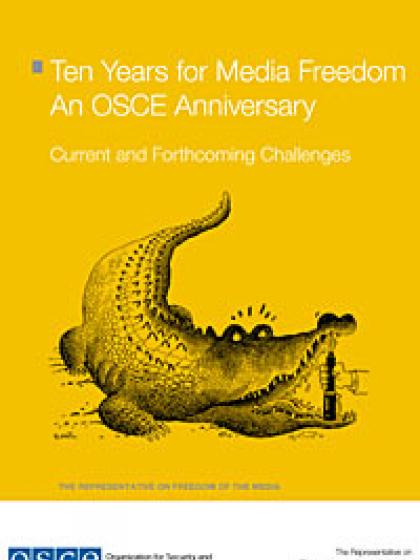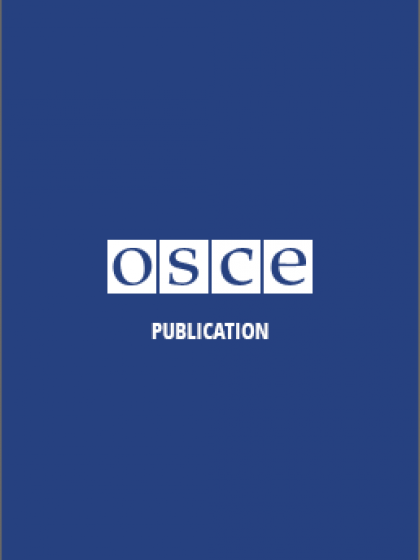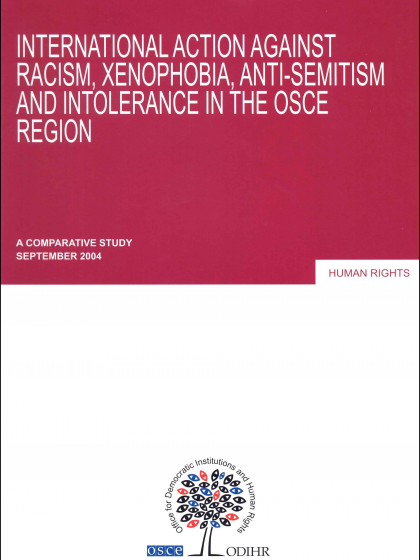Publications
Ten Years for Media Freedom- An OSCE Anniversary: Current and Forthcoming Challenges
Publishing date: 15 September 2008
Collections: RFoM publications in chronological order
Content type: Guide / manual / handbook
Where we are: OSCE Representative on Freedom of the Media
What we do: Media freedom and development
Publisher: Organization for Security and Co-operation in Europe
Published by the OSCE Representative on Freedom of the Media
Annual Report of the Secretary General on Police-Related Activities in 2023
Publishing date: 30 October 2024
Content type: Annual report
Where we are: Transnational Threats Department, OSCE Secretariat
What we do: Policing
Publisher: Organization for Security and Co-operation in Europe
This report provides a comprehensive overview of all police-related projects, activities and events, which draw on the combined strength of the OSCE’s Institutions and its network of field operations, often cutting across the OSCE’s three security dimensions.
Filling the GAPS- Annexes
Publishing date: 21 February 2008
Content type: Guide / manual / handbook
Where we are: OSCE Secretariat
What we do: Gender equality
Publisher: Organization for Security and Co-operation in Europe
"Giving you the EDGE- Essential Data on Gender Equality in the countries hosting OSCE field operations" prepared by the Gender Section of the Office of the OSCE Secretary General in collaboration with field operations and the Conflict Prevention Centre
Guidelines to Assist National Minority Participation in the Electoral Process
Publishing date: 1 January 2001
Content type: Guide / manual / handbook
Where we are: OSCE Office for Democratic Institutions and Human Rights
What we do: Elections
Publisher: Organization for Security and Co-operation in Europe
These guidelines have been developed to assist both governments and the organizations that represent or support national minorities. The assistance is directed towards developing a legislative framework for an electoral system that ensures effective participation by national minorities in public life.
Monitoring Places of Detention: A Practical Guide for NGOs
Publishing date: 20 April 2004
Content type: Guide / manual / handbook
Where we are: OSCE Office for Democratic Institutions and Human Rights
What we do: Rule of law
Publisher: Organization for Security and Co-operation in Europe
It is increasingly recognized by international experts that monitoring places of detention through regular and unannounced visits constitutes one of the most effective ways to prevent torture and ill-treatment of persons deprived of their liberty. Accordingly, the Association for the Prevention of Torture (APT) and the OSCE Office for Democratic Institutions and Human Rights (ODIHR) decided to promote monitoring programmes by national NGOs and to publish this guide.
International Action Against Racism, Xenophobia, Anti-Semitism and Intolerance in the OSCE Region: A Comparative Study
Publishing date: 10 September 2004
Content type: Guide / manual / handbook
Where we are: OSCE Office for Democratic Institutions and Human Rights
What we do: Tolerance and non-discrimination
Publisher: Organization for Security and Co-operation in Europe
This study provides an overview of international efforts to combat racism, xenophobia, anti-Semitism, and intolerance in the OSCE region.
Making Laws Work for Women and Men: A Practical Guide to Gender-Sensitive Legislation
Publishing date: 4 July 2017
Content type: Guide / manual / handbook
Where we are: OSCE Office for Democratic Institutions and Human Rights
What we do: Democratization, Gender equality
Publisher: Organization for Security and Co-operation in Europe
ODIHR’s Making Laws Work for Women and Men: A Practical Guide to Gender-Sensitive Legislation looks at the legislative process as a vital entry point for gender mainstreaming, while taking into account the direct and tangible impact of legislation on people’s lives. The Guide is primarily intended
Self-regulation in Montenegro: Challenges and Opportunities
Publishing date: 21 October 2024
Content type: Study / report
Where we are: OSCE Mission to Montenegro
What we do: Media freedom and development
Publisher: Organization for Security and Co-operation in Europe
To understand the common issues and opportunities associated with media self-regulation in Montenegro, the OSCE Mission commissioned the public opinion survey. Through 22 semi-structured qualitative interviews with journalists, editors, media owners, and regulators, this report seeks to uncover the practical realities of media self-regulation in Montenegro. Alongside the qualitative research, a quantitative survey was conducted among adult citizens of Montenegro to assess the knowledge and perceptions about media self-regulation in Montenegro.
Proceedings of 5th scientific international conference Environmental Crimes, Environmental Safety and National Security, Tirana, February 2020 – Volume 2
Publishing date: 5 March 2020
Content type: Study / report
Where we are: OSCE Presence in Albania
What we do: Climate change, Disaster risk reduction, Environmental activities, Good governance, Environmental good governance, Hazardous waste management, Water management
Publisher: Organization for Security and Co-operation in Europe
Published by the Security Academy of Albania with the support of the OSCE Presence. Bilingual publication (Albanian & English).
The Gendered Impact of Corruption in the Albanian Health Care and Tertiary Education Sectors
Publishing date: 8 March 2022
Content type: Study / report
Where we are: OSCE Presence in Albania
What we do: Democratization, Human rights, Conflict prevention and resolution, Education, Good governance, Gender equality, Rule of law, Tolerance and non-discrimination
Publisher: Organization for Security and Co-operation in Europe
The Preliminary Research “The gendered impact of corruption in the Albanian health care and tertiary education sectors” is commissioned by the OSCE Presence in Albania under the project framework “Consolidated Action against Corruption in Albania” (2020).This preliminary investigation focuses on the gendered impact of corruption in the health care and tertiary education sectors in Albania by approaching the issue through an intersectional perspective recognizing that women are not a unitary category.










